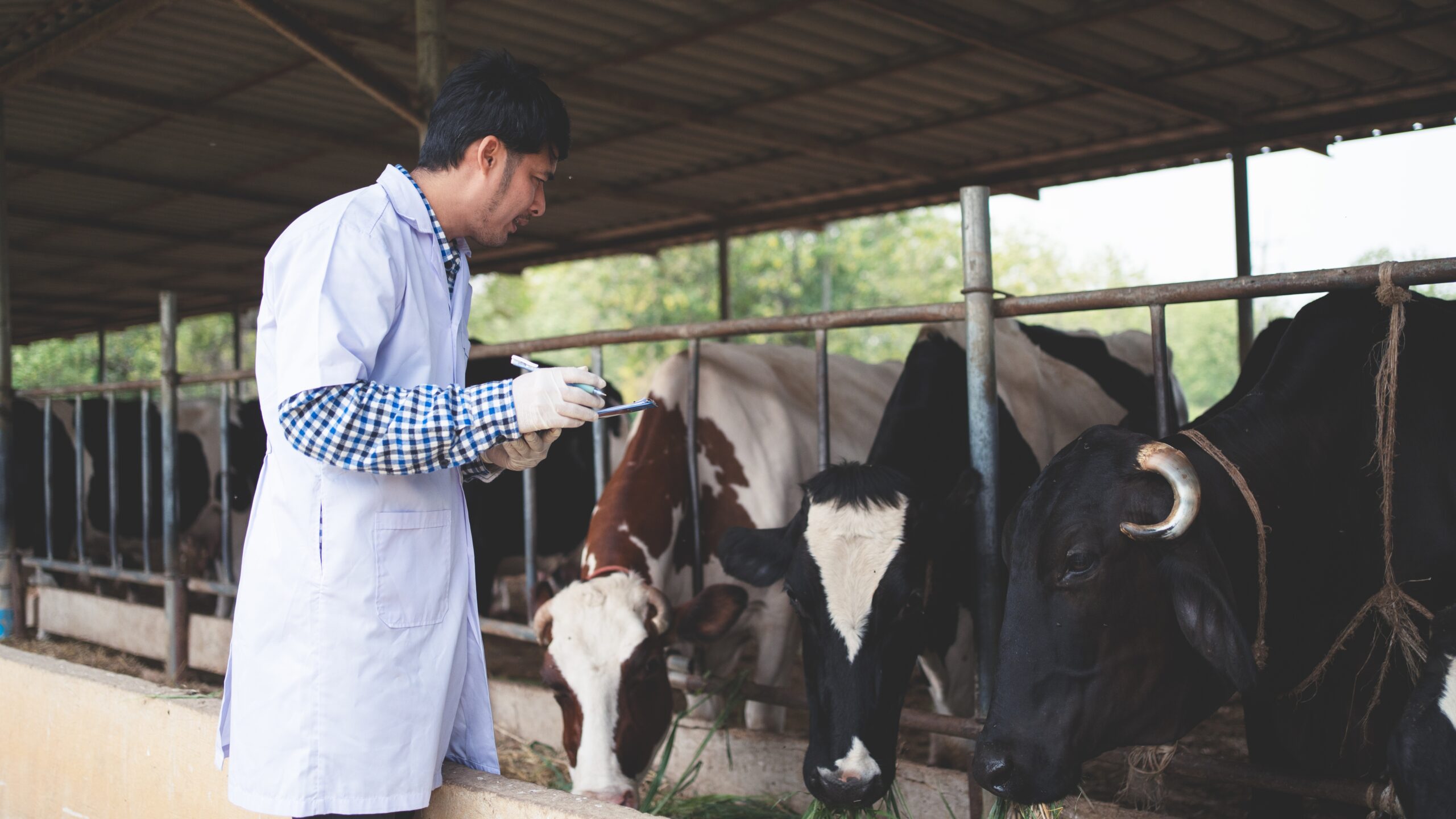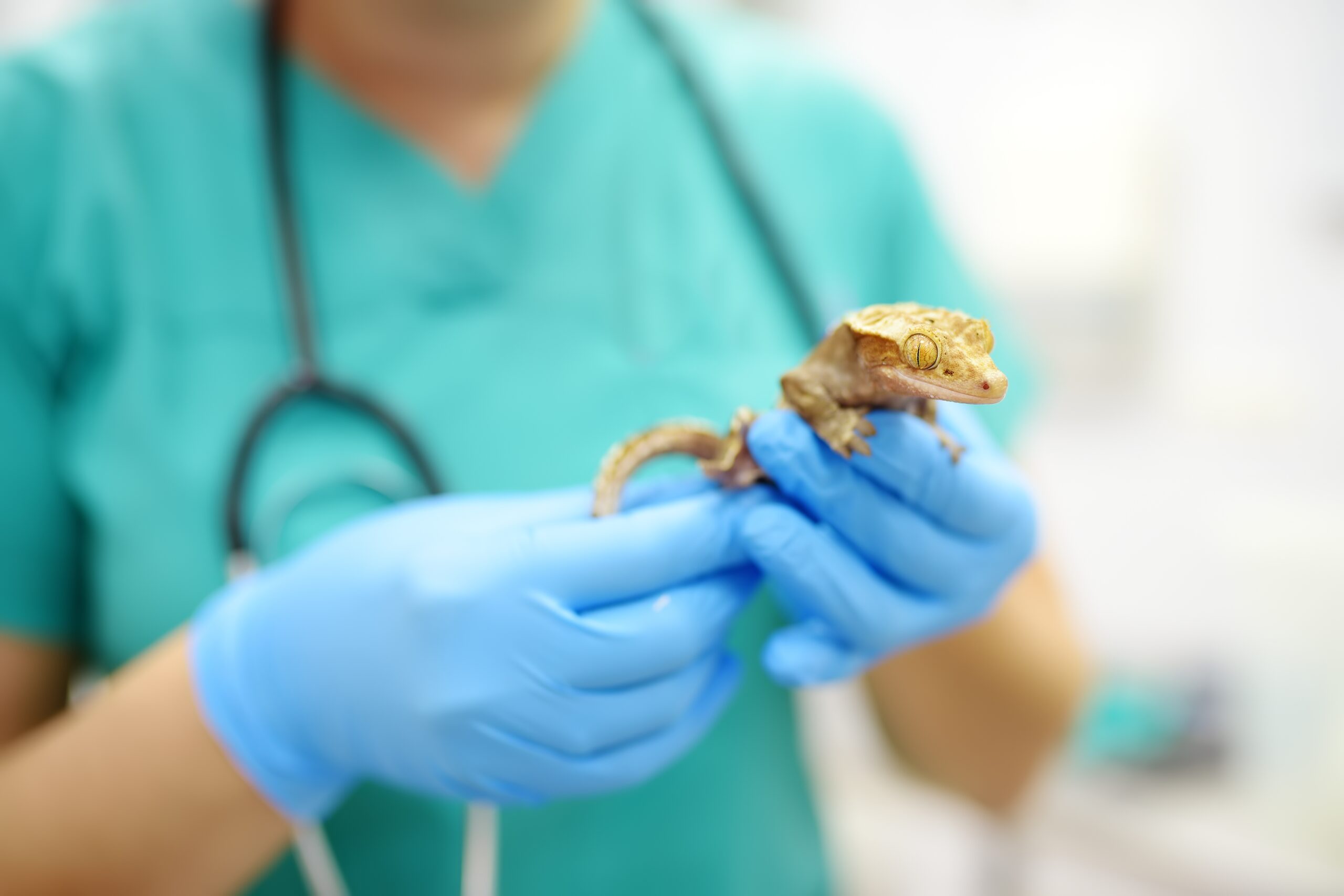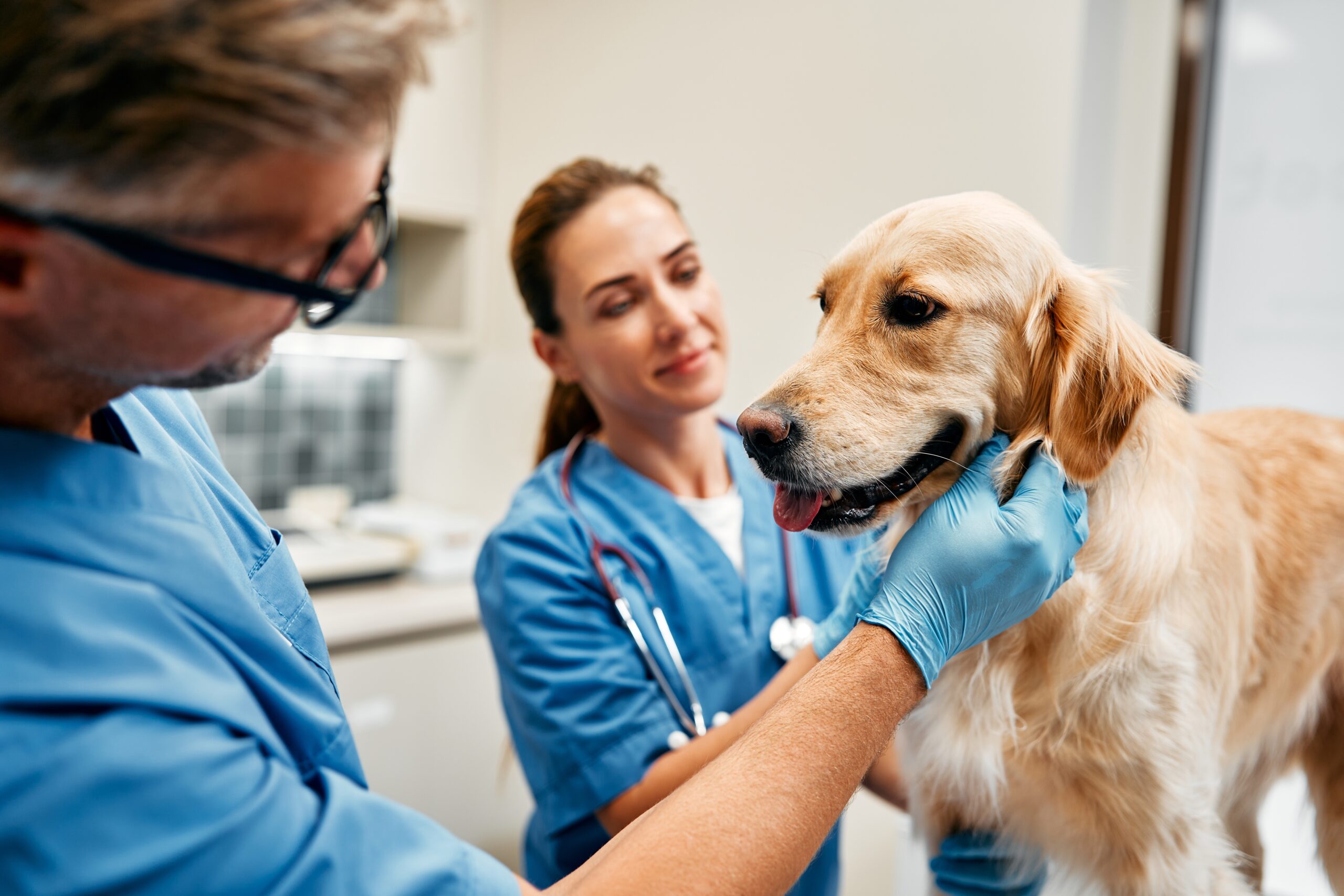
☝️ At a glance
- Veterinarians specialize in animal health in different areas like large animals, domestic pets, farm animals, wildlife, exotic species etc.
- They have expertise in diagnosing and treating illnesses, injuries, and other animal conditions.
- To become a veterinary doctor in India, one needs to complete their higher education, qualify AIPVT exam(All India Pre-Veterinary Test), and pursue a degree & internship.
- A veterinarian doctor's salary ranges from Rs. 1.0 Lakhs to Rs. 15.4 Lakhs annually.
A doctor of veterinary medicine is a doctor qualified in the field of animal health. He or she examines and diagnoses all kinds of diseases in animals. Since animals have unique organs and internal functions, they require special care by a veterinarian. These differences mean that a doctor who treats humans cannot treat animals. Therefore, a veterinarian is essential for animal care.
Veterinarians help pets to stay healthy by providing vaccinations and advice on diet and general health. Apart from domestic animals, they are familiar with domestic animals, wild animals, and exotic animals. People who are animal lovers and want to heal their illnesses, injuries, and diseases can choose a career like animal doctor (veterinarian). In this article, we'll explore 'How to become a veterinary doctor?'.

Become a global doctor with MBBS abroad!
Studying abroad can be affordable and stress-free with futureMBBS:
- World-recognized universities with English-taught programs
- On-site support in partner university cities
- Guaranteed placements & internships for hands-on experience
From selecting universities and supporting you with the application process to orientation and finding accommodation – we are at your side.
What is the role of a veterinary doctor?
A veterinarian (animal doctor) is a medical professional who specializes in the health and well-being of animals. They play an important role in maintaining the health and happiness of our beloved pets and other animals. Now, let's quickly go through the key responsibilities of a veterinarian:
1. Examine and treat animal illnesses
One of the primary duties of a veterinarian is to examine and cure various animal illnesses and health conditions. They use their expertise in animal health to recognize diseases, infections, and other health problems.
For example, if a cat is brought in with symptoms of vomiting and diarrhea, the veterinarian will perform a physical examination, take the cat's history, and possibly run tests like blood work or x-rays to understand the root cause. On the basis of the diagnosis, the veterinarian will then prescribe the required treatment, which will include medications, changes in its diet, or hospitalization.
2. Conduct routine check-ups and vaccinations
Preventive care is important in order to ensure animal health, and daily check-ups play a major role in this regard. Veterinary experts conduct regular examinations to examine an animal's overall health, including their weight, dental health, vision, hearing, and overall body condition.
During these check-ups, veterinary doctors also provide required vaccinations to protect animals from preventable diseases. For example, dogs are usually vaccinated against diseases like rabies, distemper, and parvovirus, on the other hand cats get vaccination for feline leukemia virus and feline immunodeficiency virus.
3. Offer emergency care
Just like humans, animals can also face medical emergencies that require immediate attention. Veterinary doctors are well-trained to handle serious situations and provide a life-saving care.
For example, if a cat gets hit by a car and sustains serious injuries, the veterinarian will examine the condition of cat, stabilize any life-threatening injuries, and create a treatment plan. This can involve surgical techniques like performing an emergency veterinary surgery, providing pain medication, and providing supportive care such as fluid therapy and oxygen supplementation.
4. Teach pet owners about animal care
Veterinarians at veterinary clinic not only help and treat animals but also serve as advising animal owners. They provide assistance on proper care of pet animals, including animal nutrition, animal feeding, exercise, grooming, and prevention of diseases.
For example, a veterinary doctor may educate pet owners on the importance of socialization, house training, and proper animal nutrition for their growing pet. They may also illustrate how to trim pet's nails, clean its ears, and brush its teeth to keep good hygiene.
5. Involve in animal health research
Some veterinary doctors choose to continue research to improve our understanding of the health of animals. They can look into animal diseases, create new treatment methods, or research how the environment impacts on the health of animals.
For example, a researcher in veterinary science would study how well a novel vaccination works against a particular feline illness. For the purpose of advancing veterinary medicine, they could may collect information, examine data, and write up their conclusions in academic publications.
In addition to having a broad range of responsibilities, veterinary doctors play an important role in preserving the health and well-being of animals. Moreover, they are essential to maintain the welfare of animals in our society, whether they are taking care of ill animals, promoting preventative care, or improving scientific understanding.

Study medicine abroad with 100% support!
futureMBBS offers full support to make your dream of studying medicine abroad a reality.
- Hassle-free admission guidance
- Fast-tracked visa processing
- Post-arrival support, including accommodation assistance
Types of a veterinary doctor in India
Veterinary science is a broad field with many specialties and career paths. Below we've mentioned some of the major types of veterinary doctors:
1. Companion animal veterinarians
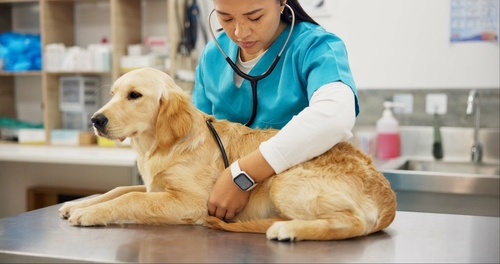
Pet veterinary doctors are one of the most renowned and well-liked categories of veterinary professionals. They specialize in treating pet animals such as dogs, cats, rabbits, and other small mammals medically. Their duties include:
- Preventive care: Through routine check-ups, vaccinations, and preventative care for diseases and parasites, domestic animal veterinarians are important to maintain the health of pets.
- Diagnostic services: These veterinary doctors are well-trained to examine various diseases and ailments in pets using methods like physical examinations, laboratory tests, and imaging procedures like X-rays and ultrasounds.
- Treatment and surgery: From treating minor injuries and diseases to conducting complex surgeries, veterinary doctors are well equipped and trained to offer a complete medical treatment to pet animals.
- Behavioral counselling: They often provide assistance and support to pet owners on how to understand behavioral issues, training, and other health practices creating a positive environment for their furry friends.
2. Large animal veterinarians
These experts are dedicated to the care and treatment of large farm animals, including cattle, horses, sheep, and pigs. They play an important role in maintaining the health and productivity of animals, which is crucial for the agriculture and food industries. Their duties involve:
- Herd health management: Large animal veterinarians collaborate directly with farmers and ranchers to create and carry-out herd health programs, which involves preventive care, nutrition plans, and disease control strategies.
- Reproductive services: They offer services to manage breeding, fertility, and guidance with complex births in farm animals.

- Emergency care: They specialize to respond to emergencies involving farm animals, such as injuries, illnesses, or accidents.
- Food safety and inspection: They play an important role in ensuring the safety and quality of food products that come from animals, including meat, dairy, and eggs.
3. Equine veterinarians
Professionals those only focus on the care and treatment of horses are known as Equine Veterinarians. Given the specific anatomy, physiology, and behavior of these amazing creatures, equine veterinarians hold specialized knowledge and skills to diagnose as well as perform surgical techniques. Their duties involve:
- Preventive care: Routine check-ups, vaccinations, and preventive treatments to upkeep the health and well-being of horses.
- Lameness evaluation and treatment: Equine veterinarians are skilled in diagnosing and treating various lameness issues, which can significantly affect a horse's performance and quality of life.

- Reproductive services: They offer services related to breeding, fertility management, and guidance with foaling (the birthing process) in mares.
- Sports medicine and performance optimization: Equine veterinarians collaborate directly with trainers and owners to make sure that performance horses are in ideal condition, addressing issues related to nutrition, conditioning, and injury prevention.
4. Exotic animal veterinarians
As we can understand from the name, exotic animal veterinarians are the experts those care and treat non-traditional pets, like reptiles, birds, small mammals, and other unique species. These animals often have complex medical needs and require distinct knowledge and expertise. The duties of exotic animal veterinarians involve:
- Species-specific care: They have a comprehensive knowledge of the unique anatomy, physiology, and behavior of various exotic species, allowing them to offer appropriate medical care.
- Husbandry and environmental considerations: They provide assistance on proper housing, nutrition, and environmental conditions to upkeep the well-being of these animals.

- Diagnostic and treatment challenges: Due to the unique nature of exotic pets, diagnosing and treating diseases may get challenging, requiring specialized skills and strategies.
- Conservation and wildlife rehabilitation: Some exotic animal veterinarians work in zoos, wildlife sanctuaries, or rehabilitation centers, in order to contribute to the conservation and rehabilitation of endangered or injured wildlife species.
5. Wildlife veterinarians
Wildlife veterinarians are dedicated professionals who focus on the health and well-being of wild animals in their natural habitats. Their work is important for maintaining the delicate balance of ecosystems and protecting biodiversity. The duties of wildlife veterinary doctors include:
- Population health monitoring: They monitor the health of wild animal populations, tracking illnesses, environmental factors, and other threats that could affect their survival.
- Wildlife rehabilitation: Wildlife veterinary doctors play an important role in treating and rehabilitating injured or sick wild animals, with the goal of releasing them back into their natural habitats when possible.
- Conservation efforts: They contribute to conservation efforts by studying the impact of human activities on wildlife populations and developing methods to mitigate these effects.
- Research and education: Wildlife veterinarians conduct research to expand knowledge about the health and behavior of wild animals, and they also participate in educational initiatives to raise public awareness about wildlife conservation.
6. Laboratory animal veterinarians
Laboratory animal veterinarians are responsible for the care and well-being of animals used in research settings, such as universities, pharmaceutical companies, and government facilities. Their work is essential for ensuring the humane and ethical treatment of these animals while also supporting the advancement of scientific knowledge. The responsibilities of laboratory animal veterinarians include:
- Animal Welfare oversight: They ensure that all research protocols involving animals comply with relevant regulations and ethical guidelines, minimizing pain and distress to the animals.
- Facility management: Laboratory animal veterinarians oversee the design, operation, and maintenance of animal research facilities, ensuring they meet appropriate standards for housing, sanitation, and environmental conditions.
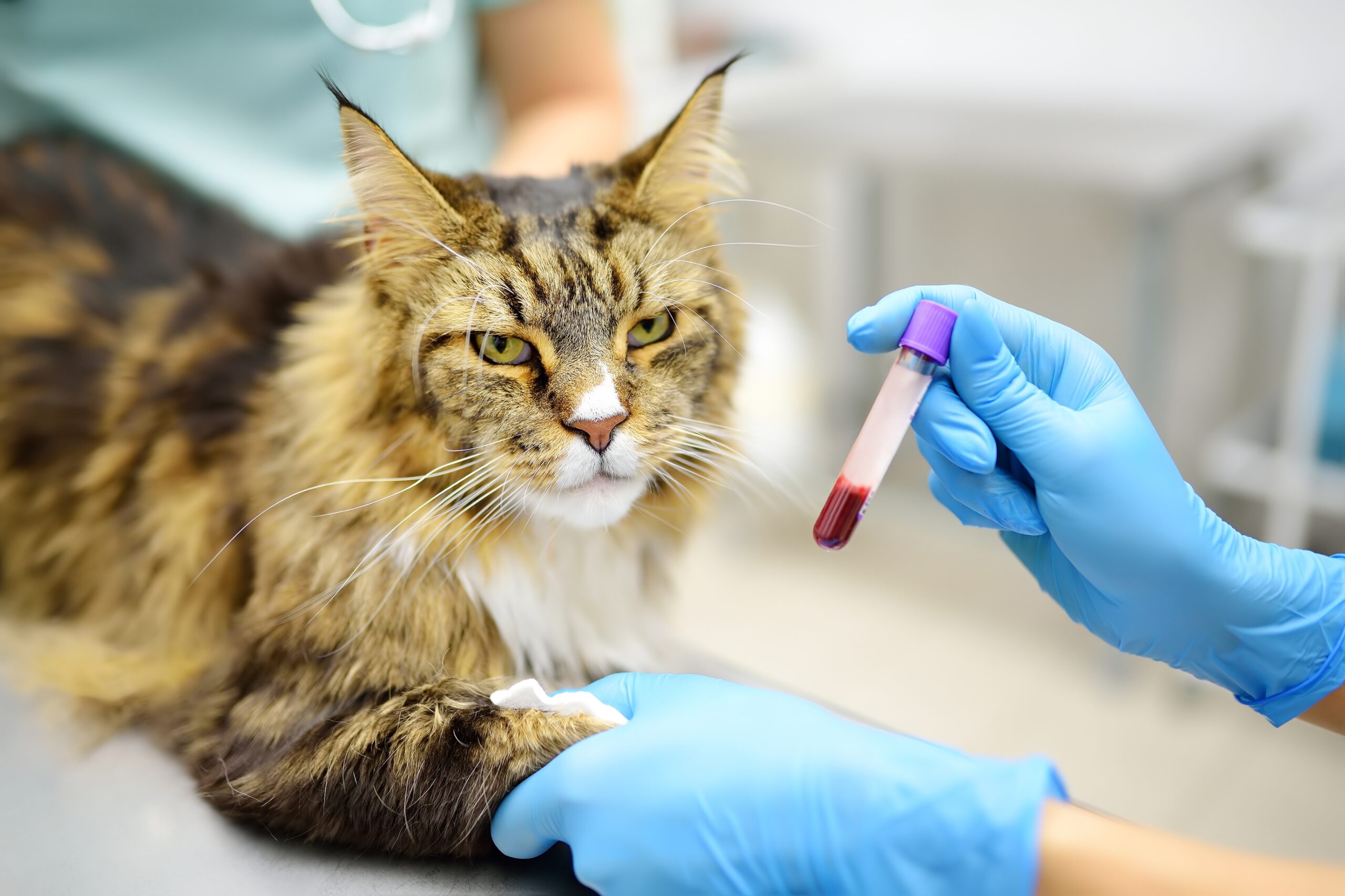
Veterinary care: They provide medical care and treatment to the research animals, monitoring their health and well-being throughout the research process.
Training and consultation: Laboratory animal veterinarians provide training and guidance to researchers and staff on proper animal handling, husbandry, and experimental techniques.
7. Public health veterinarians
Public health veterinarians play a crucial role in protecting human health by preventing and controlling zoonotic diseases, which are diseases that can be transmitted between animals and humans. Their responsibilities include:
- Disease surveillance and monitoring: Public health veterinarians monitor and track the spread of zoonotic diseases, identifying potential outbreaks and implementing strategies to prevent their transmission.
- Food safety and inspection: They are involved in ensuring the safety of food products derived from animals, such as meat, poultry, and dairy, through inspection and food safety protocols.
- Emergency preparedness and response: Public health veterinarians contribute to emergency preparedness plans and response efforts during disease outbreaks or natural disasters that may impact animal and human health.
- Education and advocacy: They promote public awareness about zoonotic diseases, proper hygiene practices, and the importance of responsible animal ownership and management.
How to become a veterinary doctor?
Are you an animal lover who dreams of dedicating your life to helping them live healthy and happy lives? Becoming a veterinarian might be the perfect career path for you! In this comprehensive guide, we'll walk you through everything you need to know about pursuing a career in veterinary medicine in India.
Becoming a veterinary doctor in India requires dedication, hard work, and a clear understanding of the educational path ahead. Here's a step-by-step guide to help you navigate your journey:
1. Complete your higher secondary education (12th standard)
The first step towards becoming a veterinary doctor is to complete your higher secondary education (10+2) from a recognized board. You must choose Physics, Chemistry, and Biology as your core subjects and aim to score well in these subjects. A strong foundation in science subjects is essential for pursuing a career in veterinary medicine.
For example, if you are in class 11, focus on understanding the basics of animal anatomy and physiology, which will be covered in your biology classes. Engage in practical lab work and experiments to gain hands-on experience.
2. Appear for the all-India pre-veterinary test (AIPVT)
After completing your 10+2 education, you must appear for a veterinary licensing examination
i.e., All-India Pre-Veterinary Test (AIPVT). This national-level entrance examination is conducted for admission to the Bachelor of Veterinary Science and Animal Husbandry (B.V.Sc. & A.H.) degree program offered by veterinary colleges across India.
This veterinary licensing examination (AIPVT )consists of multiple-choice questions covering Physics, Chemistry, and Biology. To prepare for this veterinary licensing examination exam, refer to the prescribed syllabus, solve previous years' question papers, and take mock tests to assess your performance.
For example, if you are taking the AIPVT in 2023, start your preparation well in advance, at least 6-8 months before the exam date. Create a study schedule, join coaching classes if needed, and focus on building your conceptual understanding of the subjects.
3. Enroll in a B.V.Sc. & A.H. degree program
Once you qualify the AIPVT, you can apply for admission to a five-and-a-half-year B.V.Sc. & A.H. degree program at a recognized veterinary college. This program combines classroom learning with practical training and internships.
During the course, you will study a wide range of subjects, including animal anatomy, physiology, nutrition, pharmacology, pathology, surgery, and more. You will also have opportunities to work with various animal species and gain clinical experience.
For example, in your first year, you may learn about the skeletal system of different animals, while in your third year, you may perform surgical procedures under the guidance of experienced veterinarians.
4. Complete a compulsory rotatory internship
After completing your B.V.Sc. & A.H. degree, you must undertake a compulsory rotatory internship for a duration of six months to one year at a recognized veterinary hospital or institution. This internship provides hands-on experience in dealing with various animals and working in a professional setting.
During your internship, you will rotate through different departments, such as medicine, surgery, gynecology, and radiology, to gain a comprehensive understanding of veterinary practice.
For instance, during your medicine rotation, you may assist in diagnosing and treating animals with infectious diseases, while in your surgery rotation, you may participate in spay/neuter campaigns or orthopedic surgeries.
5. Obtain your veterinary license
The final step to becoming a licensed veterinary doctor in India is to register with the Veterinary Council of India (VCI) and obtain a license. You can apply for registration after completing your internship and submitting the necessary documents, such as your degree certificate and internship completion certificate.
Once you obtain your license, you can start practicing as a veterinarian in India. You may choose to work in government animal hospitals, private clinics, or even start your own veterinary practice.
Becoming a veterinary doctor is a challenging but rewarding journey that typically takes around six to seven years after completing your 10+2 education. With passion, perseverance, and a commitment to lifelong learning, you can make a significant difference in the lives of animals and contribute to the field of veterinary medicine.
Veterinary science colleges in India to bachelor's degree
Apart from these, here are the top veterinary colleges and universities in India:
Indian Veterinary Research Institute (IVRI), Bareilly
National Dairy Research Institute (NDRI), Karnal
Govind Ballabhpant University of Agriculture and Technology, Pantnagar
Veterinary College and Research Institute (VCRI), Chennai
College of Veterinary and Animal Sciences (CVAS), Bikaner
Mumbai University (MU)
Annamalai University (AU), Chidambaram
Benaras Hindu University (BHU)
Junagadh Agricultural University, Junagadh
Veterinary colleges in abroad
Want to know how to become a veterinary doctor? For those wishing to pursue a career in Veterinary Science, here are the top-ranked universities and colleges you must consider studying Veterinary Practice and Science.
University for Veterinary Science | Courses Available | QS World University Ranking 2023 |
Royal Veterinary College, University of London | 1. BSc programs in Veterinary Medicine, Veterinary Nursing &Bioscience | 1 |
University of California, Davis | 1. Graduate Clinical Residency programs | 2 |
Utrecht University | 1. Bachelor’s degree program in Veterinary Medicine | 3 |
University of Edinburgh | 1. Bachelor of Veterinary Medicine& Surgery | 6 |
Cornell University | 1. DVM, MS & PhD degree programs | 4 |
University of Guelph | 1. DVM, bachelor’s degrees in biomedical science | 5 |
Ohio State University | 1. DVM, MS and PhD degree programs | 10 |
University of Copenhagen | Animal Science (Bachelor) | 8 |
Vetsuisse Faculty Bern and Zurich | Bachelor’s Program (First to Third Years of Study) VetuisseMaster’s Program (Fourth and Fifth Years of Study) VetuisseFederal Diploma Vetuisse | 7 |
University of Glasgow | Veterinary Medicine and Surgery BVMS | 18 |
What are the skills and qualities required to become a veterinary doctor?
Communication skills
Critical thinking
Decision making skills
Attention to detail
Service orientation
A veterinary doctor must be good at communication and pay attention to important details. He or she requires critical thinking to make effective decisions. Here are several Veterinary Doctor skills that are required to function effectively in this career.
Communication Skills: In order to become a veterinary doctor, you should have a good command over your language. It is vital for your job position to be able to convey your message to the recipient clearly and precisely. You should be able to effectively communicate with the pet owners and reduce the chances of errors caused by miscommunication. It is quite important to be a good listener in order to communicate well.
Attention to Detail: A Veterinarian is required to have extremely high attention to detail. They have to observe the animal and their recovery process.
Service Orientation: Anyone who wants to be a part of the healthcare sector, it is important for them to be service-oriented. Being able to help a person in need is considered as one of the major skills required to be a Veterinary Doctor.
Decision-Making Skills: It is necessary for a veterinarian to determine the treatment procedure after diagnosing the disease. They should be calculative as well as decisive to identify the risks.
Critical Thinking: Once completing the diagnosis of a patient the next step is to select the treatment process. The veterinarian is required to weigh the advantage & disadvantages of available options, analyze them, and then select the one which offers a better outcome.
Are certifications and internships helpful in becoming veterinary doctor?
Indeed, veterinary courses or internships are created to train students with the skills and knowledge required to work in this sector. An effective veterinary internship includes a strong educational component. It also involves journal clubs, seminars, lectures, morbidity or mortality rounds, clinicopathologic conferences, and many other training sessions. A veterinary science qualification is necessary to select for veterinary internships.
Veterinary doctor jobs and salaries at veterinary hospitals
Salary of junior veterinary doctor
Average Salary per month - 41000 INR
Job description
The job description of junior veterinarian includes diagnosing the animals, treating wounds and providing emergency care. Moreover, they provide vaccinations and do routine check-ups and provide assistance to the pet owners on preventive and care measures.
Salary description
Entry-level veterinary doctor's salary in India ranges between Rs 1.0 Lakhs to Rs 8.0 Lakhs with an average salary of Rs 5.2 Lakhs annually. The salary of Junior Veterinary Doctor in India may differ depending on the different job factors like skills and experience, job location, etc.
Salary of senior veterinary doctor
Average Salary per month - 58000 INR
Job description
The job description of senior veterinary doctor involves performing x-rays, ultrasounds and to examine the results of medical tests like blood and urine. Moreover, they have to treat the wounds, set the fractures and perform surgeries.
Salary description
The estimated salary of a senior veterinary doctor in India ranges between Rs 2.5 Lakhs to Rs 15.4 Lakhs with an average annual salary of Rs 7.2 Lakhs per annum. Their salary may vary depending on the various job factors.
Note: “The salary figures mentioned in this article are for reference purposes only."
What is the job outlook for veterinary doctor?
According to a research report, the overall population of pet dogs in India was over 27 million in 2021. The population may reach more than 43 million by 2026. In terms of pet care, India is considered as the fastest-growing country in the pet care market.
Initially, the starting career salary is not as high as in other medical fields, but the growth in this sector is very high. Showcasing the versatility of the profession, veterinary doctors can explore careers in research, food inspection, military service, and corporate positions. These days veterinarians are in high demand, as well as their expertise is valued.
Your medical career abroad starts here!
Thinking of pursuing MBBS abroad? Don’t just dream it, do it!
Start your MBBS journey!FREQUENTLY ASKED QUESTIONS
FAQs about how to become a veterinary doctor
What is the average Veterinary Doctor salary?
According to a research, a veterinary doctor salary in India ranges between Rs. 0.5 Lakhs to Rs. 10 Lakhs with an annual salary of Rs. 6.5 Lakhs.
What to do to become a veterinary doctor?
In India, you can take the NEET exam and apply for a course in Animal Husbandry of Veterinary Medicine. Whereas, to pursue this course from abroad, you need to complete the bachelor's degree (graduation), take the GRE exam, apply to a veterinary school and complete the studies. After completion, of course, apply for a license and then you will become a veterinary doctor.
Is NEET required for veterinary?
Yes, NEET is compulsory for all Indian students willing to make a career in veterinary. One needs to check the required scores with universities.
How many years is a veterinary course?
The duration of a veterinary course is likely to differ as per the country and university. On average, the course duration lies between 3 – 5 years.
